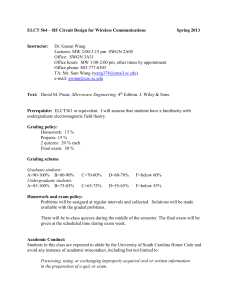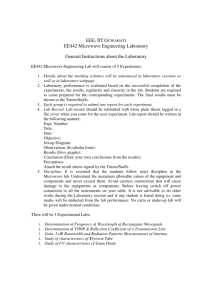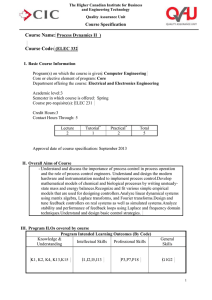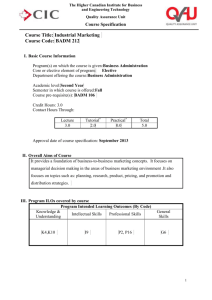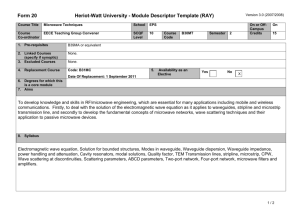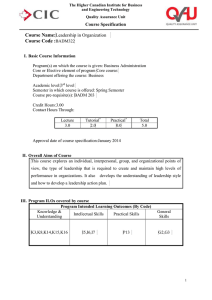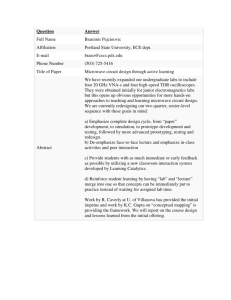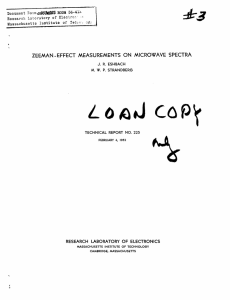COURSE TITLE (COURSE CODE)
advertisement
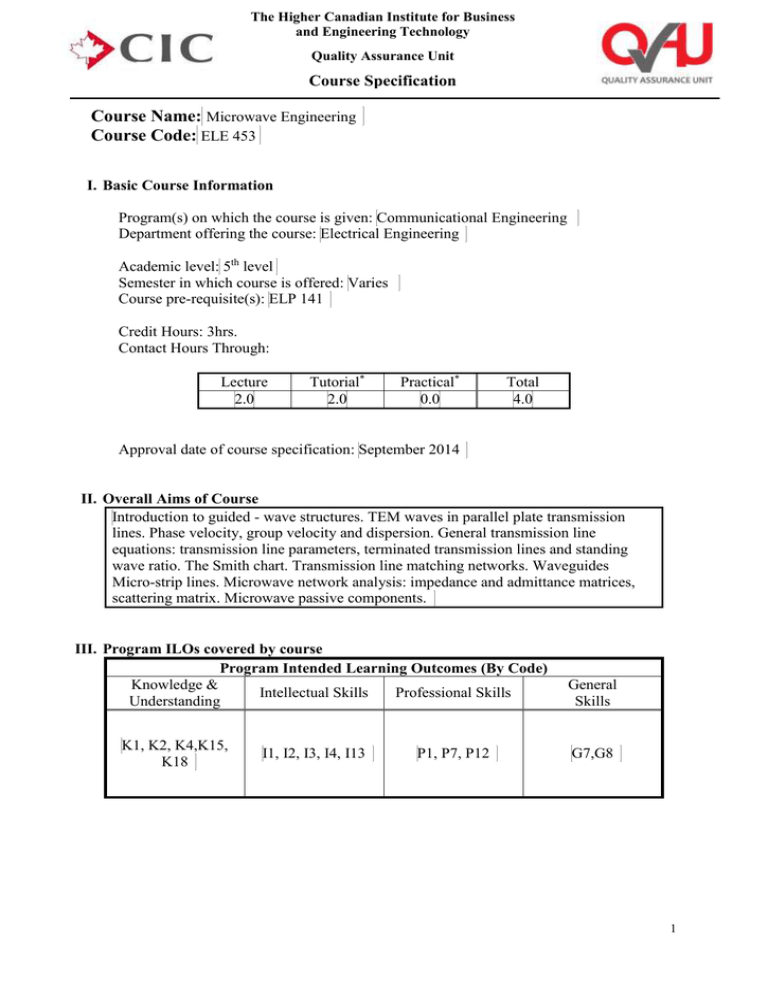
The Higher Canadian Institute for Business and Engineering Technology Quality Assurance Unit Course Specification Course Name: Microwave Engineering Course Code: ELE 453 I. Basic Course Information Program(s) on which the course is given: Communicational Engineering Department offering the course: Electrical Engineering Academic level: 5th level Semester in which course is offered: Varies Course pre-requisite(s): ELP 141 Credit Hours: 3hrs. Contact Hours Through: Lecture 2.0 Tutorial* 2.0 Practical* 0.0 Total 4.0 Approval date of course specification: September 2014 II. Overall Aims of Course Introduction to guided - wave structures. TEM waves in parallel plate transmission lines. Phase velocity, group velocity and dispersion. General transmission line equations: transmission line parameters, terminated transmission lines and standing wave ratio. The Smith chart. Transmission line matching networks. Waveguides Micro-strip lines. Microwave network analysis: impedance and admittance matrices, scattering matrix. Microwave passive components. III. Program ILOs covered by course Program Intended Learning Outcomes (By Code) Knowledge & Intellectual Skills Professional Skills Understanding K1, K2, K4,K15, K18 I1, I2, I3, I4, I13 P1, P7, P12 General Skills G7,G8 1 The Higher Canadian Institute for Business and Engineering Technology Quality Assurance Unit Course Specification IV. Intended Learning Outcomes of Course (ILOs) a. Knowledge and Understanding On completing the course, students should be able to: k. 1 Identify and demonstrate competence in university level mathematics, natural sciences, engineering fundamentals, and specialized engineering knowledge appropriate to the program k. 2 Recognize the innovations and recent trends in communications technologies. k. 3 Express unique oriented Knowledge in the relevant fields. k. 4 Explain and be aware of elementary science underlying communications engineering systems and information technology k. 5 Describe the Microwave applications k. 6 Describe the Antenna and wave propagation applications b. Intellectual/Cognitive Skills On completing the course, students should be able to: i.1 Use appropriate knowledge and skills to identify, formulate, analyze, and solve complex engineering problems in order to reach substantiated conclusions. i.2 Use brainstorming and innovation techniques to deal with problems and to develop new ideas. i.3 Demonstrate and organize tasks into a structured form. i.4 Identify the different ideas, views, and knowledge from a range of sources. i.5 Describe the practical industrial problems. c. Practical/Professional Skills On completing the course, students should be able to: p.1 Use the appropriate mathematical methods for modelling and analyzing problems in electrical, electronic and communications engineering. p.2 Create technical reports p.3 Design the systems, components and processes and test the design ideas in the laboratory or through simulation, with technical analysis and critical evaluation of results. d. General and Transferable Skills On completing the course, students should be able to: g.1 The manipulation, sorting and presentation of information in a variety of ways g.2 The use of scientific evidence based methods in the solution of problems V. Course Matrix Contents Main Topics / Chapters Duration (Weeks) 1- Introduction to Microwave 2- Rectangular waveguide 1 2 3- Circular waveguide 2 4- The directional coupler 5- Microwave resonators 6- Einstein Equations 1 2 4 Course ILOs Covered by Topic (By ILO Code) K&U I.S. P.S. G.S. k1 i1 p1 g1 k1,k5 i2 p1,p2 g1,g2 k1,k2, i2 p1,p2 g1,g2 k3, k4 k1,k4 i2 p1,p2 g1,g2 k3,k6 i2 p1,p2 g1,g2 k3,k4 i2,i4 p1,p2 g1,g2 2 The Higher Canadian Institute for Business and Engineering Technology Quality Assurance Unit Course Specification LASER Maxwell’s equations 7- Microwave Amplifiers Net Teaching Weeks 1 13 k3,k5 i2,i5 p1,p2 g1,g2 VI. Course Weekly Detailed Topics / hours / ILOs Week No. 1 2 3 4 5 6 7 8 9 10 11 12 13 14 15 Introduction Maxwell’s revision Rectangular waveguide Rectangular waveguide Rectangular waveguide Circular waveguide Circular waveguide The directional coupler Quiz #2 Microwave Networks Microwave Networks Klystron Klystron Magnetron Magnetron Smith Chart Contact Hours Theoretical Practical Hours Hours* Total Hours Sub-Topics 2 2 4 4 4 4 2 2 2 2 2 2 2 2 4 2 2 Midterm Exam 4 4 4 4 4 4 4 Final Exam 2 2 2 2 2 2 2 2 2 2 2 2 2 2 Total Teaching Hours VII. Teaching and Learning Methods Teaching/Learning Method Lectures & Seminars Tutorials Computer lab Sessions Practical lab Work Reading Materials Web-site Searches Research & Reporting Problem Solving / Problem-based Learning Projects Independent Work Group Work Course ILOs Covered by Method (By ILO Code) K&U All k1, k3 Intellectual Skills All All Professional Skills p1,p2 All p3 p3 General Skills g1,g2 g1,g2 g1,g2 g1 i5 i5 3 The Higher Canadian Institute for Business and Engineering Technology Quality Assurance Unit Course Specification Case Studies Presentations Simulation Analysis Others (Specify): VIII. Assessment Methods, Schedule and Grade Distribution Course ILOs Covered by Method (By ILO Code) Assessment Method K&U I.S. P.S. G.S. Midterm Exam Final Exam Quizzes Course Work Report Writing Case Study Analysis Oral Presentations Practical Group Project Individual Project k1,k3 All k1, k2, k3, k5 All k4,k5 Assessment Weight / Percentage i1 All 20% i1,i2,i3 10% p1,p2 g1,g2 5% 5% p1,p2 g1,g2 10% Week No. Others (Specify): IX. List of References Essential books (text books) Microwave Engineering , 2nd ed. , D. M. PozarJohn Wiley , 1998 Course notes Lecture Handouts Recommended books Microwave Devices and Circuits , 3rd ed. , S. Y. Liao Recommended books Prentice-Hall 1990 Periodicals, Web sites, etc … Essential Text Books X. Facilities required for teaching and learning Big sized lecture rooms. Computers (Personal & Notebook). Data show Course coordinator: Associate Professor/ Tamer Abdel Rahman Head of Department: Associate Professor/ Tamer Abdel Rahman Date: September 2014 4
